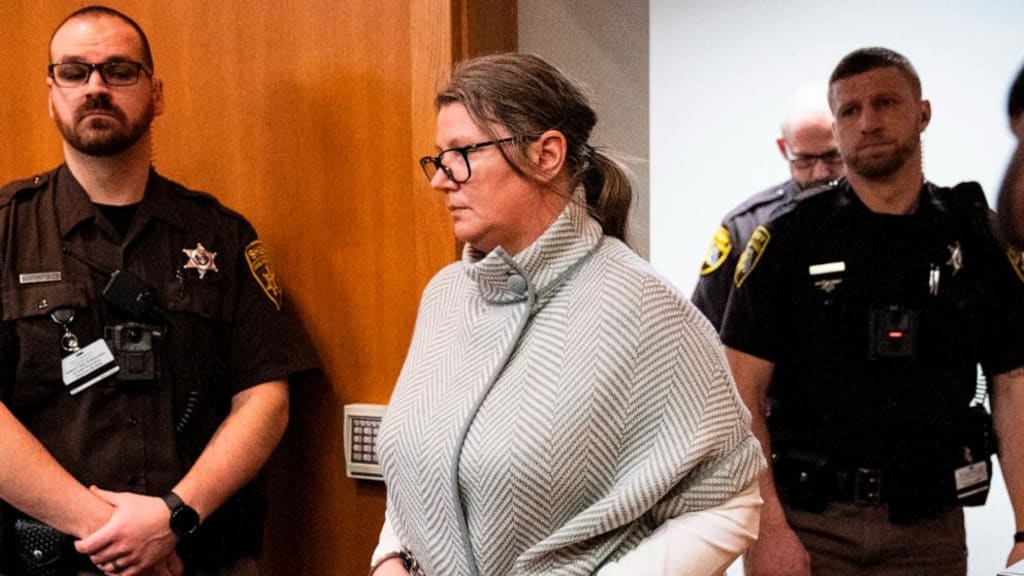Parental Accountability in the Headlines: Analyzing the Jennifer Crumbley Trial Verdict
How Far Does Parental Responsibility Extend?

Jennifer Crumbley, the mother of the Oxford High School shooter Ethan Crumbley. Let us explore Jennifer Crumbley’s trial verdict, discussing the charges against her, the trial proceedings, the guilty verdict, and the broader implications for parental responsibility and gun ownership. Please read and share your opinion on this case and its legal opinion of parental accountability in the comments.

Overview of the Michigan School Shooting Incident
The Michigan school shooting incident, a tragedy that unfolded at Oxford High School in Oxford Township, MI, resulted in the untimely death of four students. Ethan Crumbley, the teenage son of Jennifer and James Crumbley, was identified as the shooter, once again casting a spotlight on the significant issues surrounding school safety, gun control, and the responsibilities parents bear in preventing such catastrophic events. The involvement of Ethan’s parents, particularly the actions and decisions made in the days leading up to the incident, has raised critical questions about the intersection of parental oversight, mental health awareness, and gun accessibility among minors.
The Role of the Parents
This incident did not occur in isolation but is part of a disturbing trend of school shootings in the United States, prompting an urgent reassessment of laws and policies concerning gun ownership and school security measures. The role of Jennifer and James Crumbley in this tragic event, especially in terms of how the firearm used in the shooting was secured and their response to their son’s mental health struggles, underscores a pivotal moment in the ongoing debate over how best to protect children and prevent future tragedies. The broader implications of this tragedy, including the legal and societal expectations of parents’ accountability for their children’s actions, have become central themes in the wake of the Oxford High School shooting.
The Charges Against Jennifer Crumbley
In this groundbreaking case, Jennifer Crumbley was convicted on charges of involuntary manslaughter. This verdict has ignited discussions on the extent of parental responsibility in preventing tragedies involving their minor children. The core of the charges against her revolved around accusations of negligence. Specifically, her failure to adequately secure the gun her son Ethan used in the Oxford High School shooting, and her consistent disregard for the warning signs of Ethan’s deteriorating mental health formed the basis of the prosecution’s case. This case has underscored the critical importance of responsible gun ownership and the active role parents must play in monitoring their children’s mental well-being.
Adding a further dimension to the trial, Jennifer Crumbley’s personal life became a focal point of scrutiny. Her admission of engaging in an extramarital affair was leveraged by the prosecution to argue that her personal distractions significantly contributed to her negligence. This aspect of her defense painted a broader picture of her lifestyle choices and their impact on her ability to effectively address her son’s needs. The prosecution contended that her preoccupation with her own affairs led her to overlook clear indicators of her son’s escalating mental health crisis, thus failing to prevent the tragic events that unfolded at Oxford High School. This aspect of the trial not only highlighted the specific charges against Jennifer Crumbley but also brought to the forefront the broader implications of parental neglect and distraction on child welfare.
The Trial Proceedings and Evidence Presented
Extending across seven meticulous days. The court was presented with a comprehensive collection of evidence, including detailed surveillance videos capturing the movements within Oxford High School and poignant testimonies from witnesses directly and indirectly affected by the tragic events. These pieces of evidence were critical in constructing a timeline of events leading up to the shooting, providing the jury with a vivid picture of the circumstances surrounding the incident.
Compelling Evidence
One of the most compelling aspects of the trial was the focus on Jennifer Crumbley’s actions and decisions in the days leading up to the shooting. The prosecution highlighted that Jennifer was the last adult to have control over the firearm used by her son, Ethan, in the shooting. This fact, combined with evidence presented showing Jennifer’s awareness of Ethan’s deteriorating mental state — yet her failure to take decisive action — significantly influenced the jury’s perception of her culpability. The prosecution argued that this lack of intervention constituted a severe form of negligence, directly contributing to the tragic outcome of the events at Oxford High School. Through this narrative, the trial meticulously examined the intersection of parental responsibility, gun ownership, and mental health awareness, setting a precedent for evaluating such factors in legal contexts.
Verdict and Impact on Future Cases
The conviction of Jennifer Crumbley in the Michigan school shooting case represents a landmark moment in the annals of U.S. legal history, establishing for the first time that a parent of a mass shooter can be held criminally liable for their child’s actions. This verdict shifts the landscape of legal accountability, broadening the scope of who can be considered responsible in the aftermath of such tragedies. It underscores the vital role of parental oversight in gun ownership and the importance of responding to warning signs of potential violence. Legal experts have pointed out the difficulty of proving such cases, making the guilty verdict against Jennifer Crumbley all the more significant. This case has tested the boundaries of the legal principle of parental responsibility and set a precedent that may influence the handling of future incidents where a minor commits a violent act.
The Reactions
The reaction to the verdict from the families of the victims sheds light on the societal demand for accountability in the face of tragedy. Their relief and emphasis on addressing systemic failures point to a broader expectation that all possible measures should be taken to prevent similar incidents. This case not only highlights the legal ramifications for parents who fail to secure firearms or ignore signs of their child’s deteriorating mental health but also serves as a cautionary tale, potentially impacting how guns are stored in homes with children and how parents respond to their children’s mental health needs. In essence, the verdict against Jennifer Crumbley does not just mark a conclusion to a legal proceeding; it signals a shift in societal and legal expectations regarding parental accountability in preventing school shootings.
Defense Strategies and Reactions
Throughout the trial, Jennifer Crumbley’s defense strategy involved shifting responsibility away from herself, apportioning blame to multiple parties, including her husband James, the educational system, and Ethan Crumbley, the perpetrator of the Oxford High School shooting. This multifaceted defense aimed to dilute her culpability by suggesting a systemic failure that extended beyond her individual actions. Despite the prosecution’s argument that Jennifer’s negligence in securing the firearm and ignoring Ethan’s mental health warnings directly contributed to the tragedy, she maintained a stance of no regret for her actions during the trial. This expression, or lack thereof, of remorse, was particularly striking given the gravity of the situation and has sparked discussions on accountability and parental responsibility in the wake of such incidents.
Further complicating the defense’s position was the revelation that Ethan Crumbley’s access to the gun used in the school shooting was not adequately restricted by his parents. This point became a central element of the prosecution’s case, underpinning the argument that Jennifer and James Crumbley’s failure to secure the firearm was a form of gross negligence. The defense’s attempt to navigate around this critical fact highlights the complex interplay of individual and systemic responsibilities in preventing such tragedies. This aspect of the trial underscores the broader societal debates surrounding gun ownership, parental oversight, and the mechanisms in place within educational institutions to identify and act upon potential threats.
The Broader Context of Parental Responsibility
The trial and subsequent conviction of Jennifer Crumbley have significantly underscored the vital discussions surrounding responsible gun ownership and the extent of parental accountability for their children’s actions. This case has ventured into relatively uncharted legal territory by affirming the premise that parents can indeed be held liable for the violent outcomes resulting from their negligence in securing firearms and ignoring the warning signs of their child’s deteriorating mental health. The verdict against Jennifer Crumbley, marked by her failure to secure the gun used in the Oxford High School shooting and her inattention to her son’s mental health needs, serves as a poignant example of this accountability.
Expectations of Parental Responsibility
Moreover, this conviction brings into sharp relief the broader societal expectations on parents to actively engage in preventing tragedies of this nature. By setting a new legal precedent, the case opens the door for future legal actions to be taken against parents or guardians who fail in their duty to responsibly manage access to firearms within their homes and to heed warning signs exhibited by their children. This trial, therefore, not only questions the boundaries of parental responsibility but also highlights the critical need for a societal shift towards more stringent measures in gun ownership and mental health awareness.
The Father James Crumbley’s Impending Trial
Following the conviction of Jennifer Crumbley, the legal spotlight shifts to her husband, James Crumbley, whose trial looms on the horizon. Charged under the same allegations of involuntary manslaughter connected to their son’s actions at Oxford High School, James’s trial presents a pivotal next chapter in this unprecedented legal saga. Legal experts believe that James might enter his trial with a slight edge due to distinctions in his direct interactions and involvement with the firearm and his son’s access to it. However, the crux of his trial will revolve around the nuanced details of his actions and inactions leading up to the tragic event, setting a stage where the specific evidence brought forward will play a critical role in determining his legal fate.
The outcome of James Crumbley’s trial is anticipated with keen interest, not only because of its potential to further define the boundaries of parental responsibility in the context of a child’s violent actions but also for its implications on the broader dialogue surrounding gun ownership and mental health awareness. As attorneys prepare to navigate through a complex maze of legal arguments and evidentiary presentations, the forthcoming trial underscores the ongoing societal quest for accountability in the aftermath of tragedy, echoing the grave lessons learned from these events at Oxford High School.
Conclusion and Societal Implications
The conviction of Jennifer Crumbley in the aftermath of the Oxford High School shooting marks a pivotal moment in the discourse on parental responsibility and gun control within the United States. This case underscores the grave consequences of negligent gun ownership and the crucial role parents play in monitoring their children’s mental health and access to firearms. By holding Jennifer Crumbley accountable for her indirect role in the tragic event, the verdict sends a strong message about the seriousness with which society views the obligations of gun owners, especially those with children. This legal milestone is expected to influence how future cases involving parental negligence in school shootings are approached, potentially leading to more stringent measures aimed at preventing such devastating incidents.
About the Creator
Matthew Jack
My 30-year law enforcement career fuels my interest in true crime writing. My writing extends my investigative mindset, offers comprehensive case overviews, and invites you, my readers, to engage in pursuing truth and resolution.






Comments
There are no comments for this story
Be the first to respond and start the conversation.